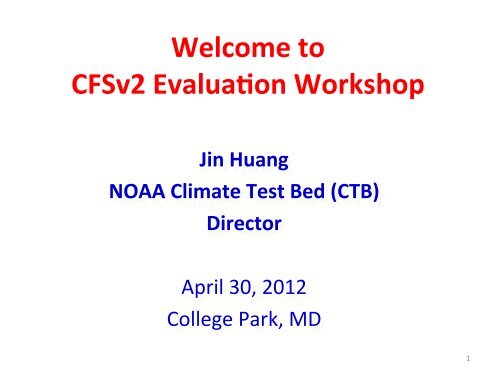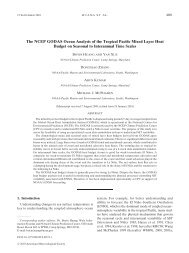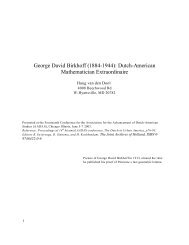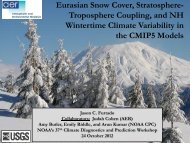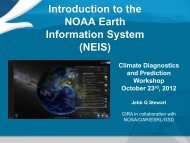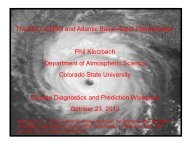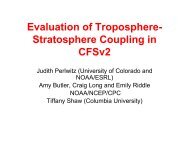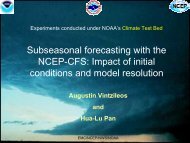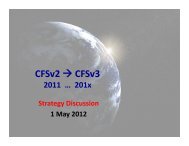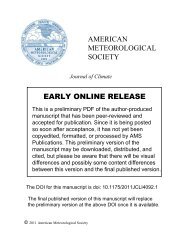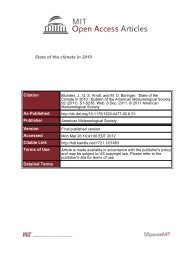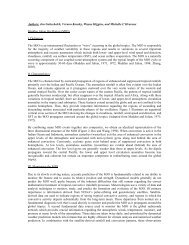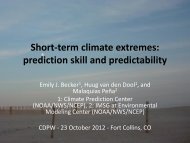J. Huang - Climate Prediction Center - NOAA
J. Huang - Climate Prediction Center - NOAA
J. Huang - Climate Prediction Center - NOAA
Create successful ePaper yourself
Turn your PDF publications into a flip-book with our unique Google optimized e-Paper software.
Workshop Organizers • Jin <strong>Huang</strong> (NCEP/CTB) • Jim Kinter (COLA) • Shrinivas Moorthi (NCEP/EMC) • Wanqiu Wang (NCEP/CPC) • Annarita MarioL (CPO) 2
Special Thanks • Workshop sponsorship from CPO and NCEP • Logis1c support o Sky Yang (CPC) o Tania Sizer (UCAR) o Esther Major (Raytheon) • All par1cipants for your interest in NCEP CFS • Great responses to the discussion ques1ons 3
Research TopicsAONCEP Co-PILOIProposal• Reanalysis /Reforecasts• Earth SystemModeling• Tropicaloscillations• Modelphysics• Etc.Research<strong>Climate</strong> ForecastProductsMMECFS ImprovementsR2OO2ROperationsImprovedproducts andservices<strong>NOAA</strong> <strong>Climate</strong> Test Bed (CTB) Mission To accelerate the transi1on of scien1fic advances from the climate research community to improved <strong>NOAA</strong> climate forecast products and services. • CTB supports R2O and O2R transitionso CTB grants funded by CPO/MAPPo CTB Facility (FTE, computer) support by NCEP• Three science priorities1) CFS model improvement2) Multi-model ensembles3) <strong>Climate</strong> forecast products• CTB provides a platform and mechanisms for NCEP tointeract and collaborate with the external climateresearch community4
133 Registered Par1cipants (and 59 Abstracts) NCEP/CPC NCEP/EMC Other <strong>NOAA</strong> COLA UniversiWes and Private InternaWonal Other Gov. Agencies IRI 5
Science Presenta1ons 20 minutes including Q&A Logis1cs Today: • Lunch (provided) and Poster Viewing • Slides show of highlights of CFSv2 Evalua1ons (Thanks to Arun Kumar) Tomorrow: • Lunch on your own • Look at outside of the new NCWCP building 6
Workshop Sessions 1. Programma1c Overview 2. CFSv2 Evalua1ons 1) Assessment of CFSv2 PredicWon Skills 2) EvaluaWon over ocean 3) EvaluaWons of climate modes and decadal variability 4) EvaluaWon over land 3. Physical/<strong>Climate</strong> Processes and Modeling 4. <strong>Climate</strong> Modeling Strategy 5. Synthesis Reports (Kumar and Moorthi) 6. Discussions (Lead: Kinter) – Start with a summary of all responses to the quesWons 7
Ques1ons to be Discussed 1. CFSv2 Evalua1ons • Do the CFSv2 evaluaWons included in submibed abstracts and done elsewhere sufficiently document the model's current status as a climate forecast and research tool and the improvements from CFSv1 to CFSv2? • What addi1onal diagnos1cs and experiments, especially process-oriented model diagnosis, do you suggest to further understand the model biases in CFSv2? • Does the current data archive support process-‐oriented diagnosis of CFSv2? Have we sufficiently capitalized on the data collected from process studies, field campaigns and satellite measurements for CFSv2 model evaluaWons and improvements? • What standard evalua1on metrics for CFS should be generated rouWnely by NCEP? 8
Ques1ons to be Discussed – cont. 2. Model improvements towards CFSv3 • How can the model evalua1on/diagnosis process for CFSv2 be integrated into the CFSv3 development process? • In the CFSv3 Planning Mee1ng in August 2011, several recommenda1ons were made for how to improve the model development process, including, among others, that Planning for the next generaWon of CFS. • What are the poten1al synergies among climate modeling efforts at NCEP, at other <strong>NOAA</strong> labs/centers, and in the external community? How can <strong>NOAA</strong> take best advantage of these synergies? • What are the specific requirements for NCEP infrastructure to support for CFSv3 development by NCEP and its external collaborators? 9
Workshop Objec1ves • Evaluate CFSv2 • Improvements in CFSv2 over CFSv1 • Biases in CFSv2 • Plan for model improvement towards CFSv3 • Design experiments to understand how to incrementally improve upon CFSv2, • Test coupling of the latest GFS with state-‐of-‐the-‐art model components. or • Bold and far-‐reaching vision and strategy for CFSv3 • Define priori1es and mechanisms for NCEP -‐ external collabora1ons on climate modeling 10
Expected Workshop Outcome A White Paper on CFSv3 development • Near team priority • Long-‐term vision and strategy • A Core Team will develop a draf afer the workshop and circulate among all the par1cipants. 11


